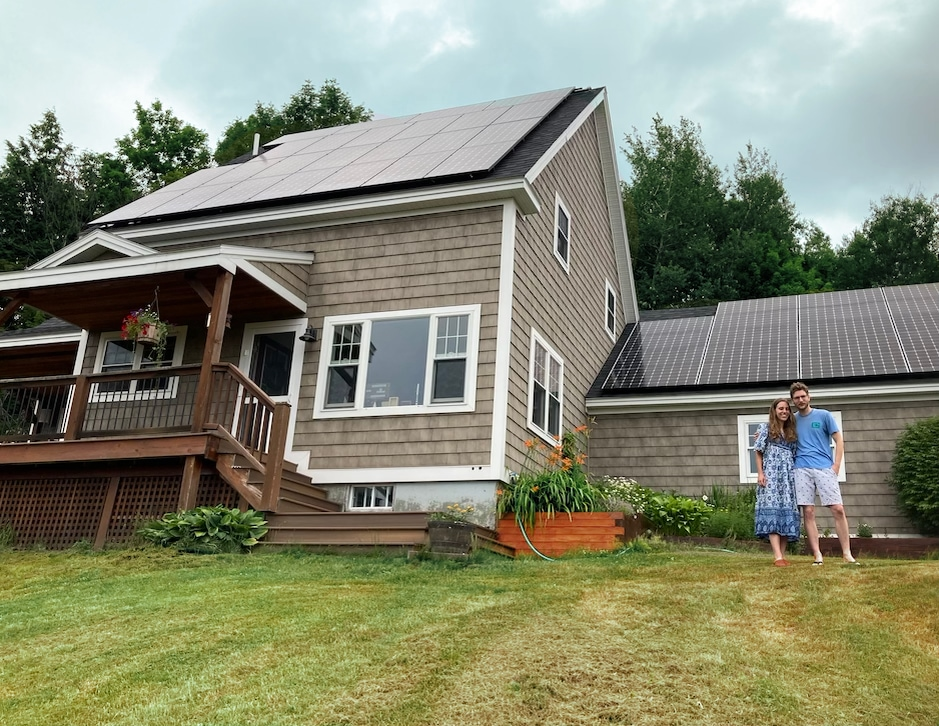
Should I go solar? We’ve got 5 answers that point to yes!

Solar may be a big decision, but that’s because it comes with some pretty big payoffs. Whether you’re in it for the green for your wallet or to go green for the planet, there are plenty of reasons to get solar panels in Vermont.
Save Money on Electricity with Solar Panels
OK, Vermont isn’t exactly the Sunshine State, but solar is still valuable here. The U.S. Energy Information Administration reports that the average cost of electricity in Vermont is 19.8 cents per kilowatt-hour (kWh)—or the seventh most expensive electricity in the U.S. (Though, it’s worth noting that many of the customers we work with report costs closer to 16-17 cents, which is still pretty high.) This means that the payback period for your solar investment is comparable to sunnier states like Florida, where power costs a mere 12 cents.
And, you’re protecting yourself from future rate increases. When you buy solar today, you’re locking in your electricity costs for the lifespan of your system. (How long do solar panels last? When you go with Green Mountain Solar, we pick panels that come with a 25-year production warranty.
Related: How Solar Protects Against Electricity Rate Hikes
Green Solar Energy Is Good for the Environment
So many Green Mountain Solar customers tell us they’ve gone solar for the simple reason that it’s the right thing to do for our planet. Replacing greenhouse gas-intensive, finite resources like fossil fuels with this renewable, clean source of power is a great way to shrink your carbon footprint.
Electricity contributes about 8% of the total greenhouse gasses in our state, according to Energy Action Network. It may seem small, but that’s the equivalent of 174,995 cars driving for a year. Opting for a power source with a clean footprint is a great way to do your part to slash this.
Plus, you can double down on your green investment by swapping out major pollution sources with electric ones that can be run off of your solar panels. Two biggies are transportation and heating/cooling. Transportation generates 45% of our state’s greenhouse gas emissions and temperature control is another 28%. Consider switching to an electric car or adding an energy-efficient heat pump (and yes, Green Mountain Solar offers heat pumps). When Green Mountain Solar builds your solar system, our solar advisors take this kind of electricity usage into account so that all of your energy needs can be met with green energy.
Avoid High Electric Bills
When you’re making a budget for your home, ever look at the line for electricity and feel a big question-mark appear above your noggin? Then, there’s the dread of looking at that unopened bill and wondering what the damage is going to be this month. Forget that! Have better control over your finances. With solar, your electricity is paid for with the cost of the system itself.
If you opt to go with our financing options through VSECU, you’ll have one regular monthly payment with no surprises month to month. And, you can feel good knowing that those payments are building towards your solar investment. It’s like the difference between paying rent and paying off your mortgage.
More: How Do I Pay for Solar Panels?
Shop Local for Your Electricity
Vermonters get the importance of the local food movement. Bring that ethos even closer to home with solar. What’s more local than energy from your own roof or yard?
Energy Action Network calculates that, on average, our state sends $1.5 billion out of state annually, largely to pay for fossil fuels. Not to mention that another 44% of our renewable energy comes from outside of Vermont as well. As a Vermont-based solar company, we’re a little biased, but we’d love to see your dollars go to work to support our economy and keep more jobs right here.
Take Advantage of Vermont Net Metering Policies
Net metering is when solar panels send power not used at the home out to the grid, and the utility pays you for this power. A properly sized system will take this into account so you generate enough electricity during the day so even when you buy power from the grid (say, at night), you have a bank of credits ready to pay it off. Translation: Bye-bye, electric bill!
By Julia Westbrook
Read On: How Does Net Metering Work in Vermont?

Leave a Comment